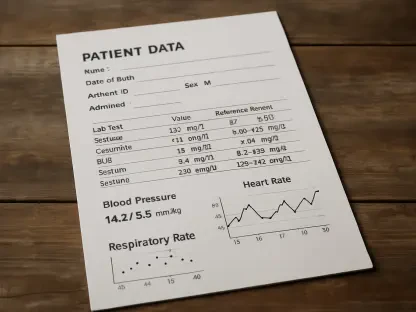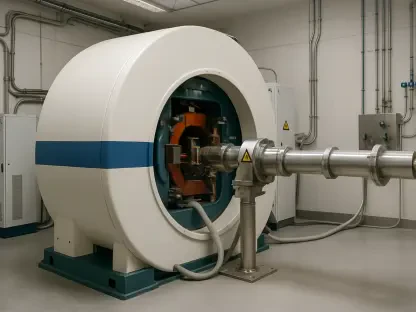With the rapid advancement of technology, the healthcare sector faces significant challenges in keeping up with cybersecurity demands. This reality becomes even more urgent when considering the sensitive nature of medical data and the potentially catastrophic consequences of cyberattacks on healthcare systems. Recent surveys suggest a near-universal inclination among healthcare organizations to integrate artificial intelligence (AI) to bolster their cybersecurity strategies in 2025.
The Promising Role of AI in Healthcare Cybersecurity
Implementation of AI Tools
A recent survey from the Cyber Risk Alliance Cybersecurity Buyer Intelligence Report revealed that nearly 90% of healthcare organizations plan to integrate AI into their cybersecurity frameworks by year’s end. This figure is particularly notable given that about 50% of these organizations have already initiated the use of AI tools. The overwhelming majority view AI as a crucial solution for handling various cybersecurity challenges, ranging from threat intelligence to risk assessment and incident response.
Healthcare institutions have started recognizing AI’s proficiency in data analytics and its ability to manage large volumes of data swiftly and accurately. For example, by employing AI in threat intelligence, about 60% of organizations can identify potential cybersecurity threats far more efficiently than through traditional methods. Another 54% of these organizations use AI for detailed data analytics and risk assessments. The ability of AI to detect anomalies in data patterns and predict potential vulnerabilities can significantly mitigate risks and ensure robust data security.
Incident Response and IoMT Management
Incident response and IoMT management are other key areas where AI is expected to make a substantial impact. Roughly 49% of surveyed organizations plan to adopt AI for these use cases by year’s end. The increasing connectivity of medical devices, or the Internet of Medical Things (IoMT), introduces new vulnerabilities that require robust and adaptive security measures.
AI can enhance the management of IoMT by implementing endpoint security solutions, encryption, and comprehensive device management protocols. As medical devices continue to proliferate, so do the entry points for cyber threats. AI can monitor these devices continuously, provide real-time alerts for any suspicious activity, and even offer automated responses to neutralize threats. This capability is vital for ensuring device integrity and patient safety, particularly in an era where medical technology is deeply integrated into patient care.
Challenges and Concerns
Addressing Data Security, Privacy, and Ethical Issues
Despite the optimism surrounding AI’s potential in healthcare cybersecurity, several challenges remain. A significant concern is data security and privacy, with 69% of organizations worried about the adequate protection of sensitive medical information. The integration of AI systems can potentially expose data to new vulnerabilities if not properly managed. Ensuring rigorous encryption standards and maintaining stringent access controls are therefore critical.
In addition to these technical concerns, ethical and legal hurdles have also played a role in slowing down the widespread adoption of AI in this sector. Questions around data ownership, patient consent, and the ethical use of AI-driven decisions in healthcare settings continue to be debated. Transparent policies and clear regulatory frameworks are necessary to address these issues, build trust, and ensure the ethical deployment of AI technologies.
Financial Investment and Training Requirements
Another notable worry among healthcare organizations is the increased spending associated with adopting AI tools. About 60% of organizations expressed concerns over the financial implications, given that implementing AI solutions often involves substantial upfront costs and ongoing maintenance expenses. Despite these costs, the long-term benefits in enhancing cybersecurity and protecting patient data are seen as justifying the investment.
Moreover, the integration of AI into healthcare cybersecurity necessitates significant staff training. Nearly 59% of organizations highlighted the need for proper employee training to effectively use AI tools. This training involves not only understanding how to work with AI technologies but also interpreting AI-generated insights and maintaining the systems. Proper training ensures that staff can fully leverage AI capabilities, respond promptly to cyber threats, and maintain the security of healthcare systems.
Conclusion: Looking Ahead
The healthcare field is confronting significant challenges in meeting cybersecurity needs due to rapid technological advancements. This concern is magnified by the sensitive nature of medical data and the potentially disastrous effects of cyberattacks on healthcare systems. Protecting patient information is crucial, and any breach can lead to severe consequences, including the loss of trust and potential harm to patients. Recent surveys reveal that nearly all healthcare organizations aim to incorporate artificial intelligence (AI) in 2025 as a key component to enhance their cybersecurity measures. AI promises to bring about more sophisticated defenses, helping to identify and mitigate threats more effectively. This strategic shift reflects an industry-wide commitment to staying ahead of cybercriminals and ensuring the safety and confidentiality of medical records. It’s clear that adopting advanced technology like AI isn’t just beneficial but essential in modernizing healthcare cybersecurity efforts.









